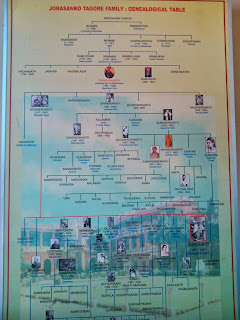Rabindranath And Chandannagar
Relationship of Rabindranath with Chandannagar was very deep. The poet used
to live several times at several houses of Chandannagar. 'Janhabi
Nibas' near river Ganga is one of those houses. The poet wrote, on the
top, there was a room with opened doors, from where I used to see the
sunlighted net
on the top new leaves of bushy 'Bakul' tree. Here I once lived. The
poet wrote, those beautiful days of mine
on the bank of river Ganga, were just like dedication of full bloomed
lotuses on the river Ganga.
Unfortunately the house is now neglected, proper care and
conservation of this house never seen Chandannagar.
The poet inaugurated the Banga Sahitya Sammelan at Chandannagar in the
Bengali year 1343.
Where the Gondalpara Jute Mill situated now, a bungalow was there
named Moran saheb-er bagan bari. Moran means Lat Saheb. In Latin, it
means 'which glitters in dark'. The poet mentioned about this house in
his short story 'Adhyapak O Apod' (The Professor And The Unwanted).
Rabindranath spent long days in a house named 'Patal Bari' near Strand
of Chandannagar. This house was once under the foreign traders. It was
a rest house of French navy. Then Jogendra Nath Khan occupied it.
Tagore family later taken the house from him on rent. In front of the
house, on river Ganga, the boat 'Padma' used
to anchor. The poet used to sit on the boat for hours.
'Bouthan' of the poet Kadambari Debi learnt riding horse while she
lived in this house. The poet wrote in this house, a poem titled
'Mistannita' within the collection 'Prahasini' to his granddaughter
Parul Debi, who was the daughter of Sharat Chandra Lahiri of
Baranagar. The poet sent his hair to Parul Debi inside the envelope
with this poem on 16 Magh, 1343 (Bangla).
That hair, used chair, pen and shoes conserved carefully at
Chandannagar heritage archive.
The people of Chandannagar intend earnestly that on the occasion of
150 birth anniversary of Rabindranath Tagore, Chandannagar may find
its historical importance on the pages of Bengal's history. The world
should know the immense importance of this city in the life of great
poet Rabindranath Tagore.--
A. B.
to live several times at several houses of Chandannagar. 'Janhabi
Nibas' near river Ganga is one of those houses. The poet wrote, on the
top, there was a room with opened doors, from where I used to see the
sunlighted net
on the top new leaves of bushy 'Bakul' tree. Here I once lived. The
poet wrote, those beautiful days of mine
on the bank of river Ganga, were just like dedication of full bloomed
lotuses on the river Ganga.
Unfortunately the house is now neglected, proper care and
conservation of this house never seen Chandannagar.
The poet inaugurated the Banga Sahitya Sammelan at Chandannagar in the
Bengali year 1343.
Where the Gondalpara Jute Mill situated now, a bungalow was there
named Moran saheb-er bagan bari. Moran means Lat Saheb. In Latin, it
means 'which glitters in dark'. The poet mentioned about this house in
his short story 'Adhyapak O Apod' (The Professor And The Unwanted).
Rabindranath spent long days in a house named 'Patal Bari' near Strand
of Chandannagar. This house was once under the foreign traders. It was
a rest house of French navy. Then Jogendra Nath Khan occupied it.
Tagore family later taken the house from him on rent. In front of the
house, on river Ganga, the boat 'Padma' used
to anchor. The poet used to sit on the boat for hours.
'Bouthan' of the poet Kadambari Debi learnt riding horse while she
lived in this house. The poet wrote in this house, a poem titled
'Mistannita' within the collection 'Prahasini' to his granddaughter
Parul Debi, who was the daughter of Sharat Chandra Lahiri of
Baranagar. The poet sent his hair to Parul Debi inside the envelope
with this poem on 16 Magh, 1343 (Bangla).
That hair, used chair, pen and shoes conserved carefully at
Chandannagar heritage archive.
The people of Chandannagar intend earnestly that on the occasion of
150 birth anniversary of Rabindranath Tagore, Chandannagar may find
its historical importance on the pages of Bengal's history. The world
should know the immense importance of this city in the life of great
poet Rabindranath Tagore.--
A. B.





Comments